
Politics & Society
The power of Garma
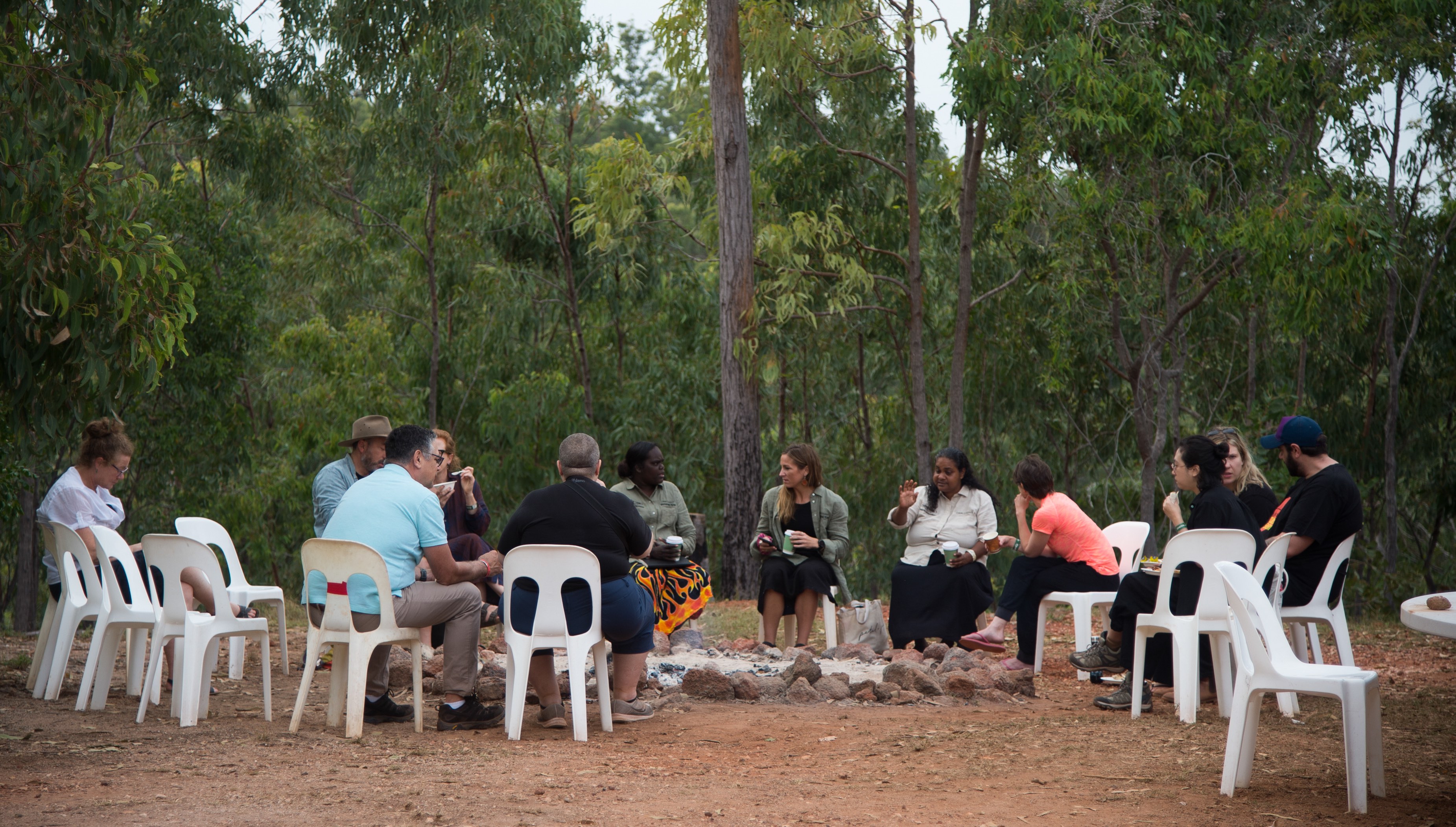
The Garma Festival is an invitation to walk and work with the oldest living culture in the world — to listen deeply with purpose
Published 24 August 2022
The Garma Festival is Australia’s premier Indigenous cultural exchange event, hosted by the Gumatj clan.
It’s a celebration of the cultural, intellectual and ceremonial traditions of Yolŋu people in Northeast Arnhem Land, shared with business leaders, political leaders, Yolŋu clan leaders, academics and journalists to discuss the most pressing issues facing Indigenous and Yolŋu communities.
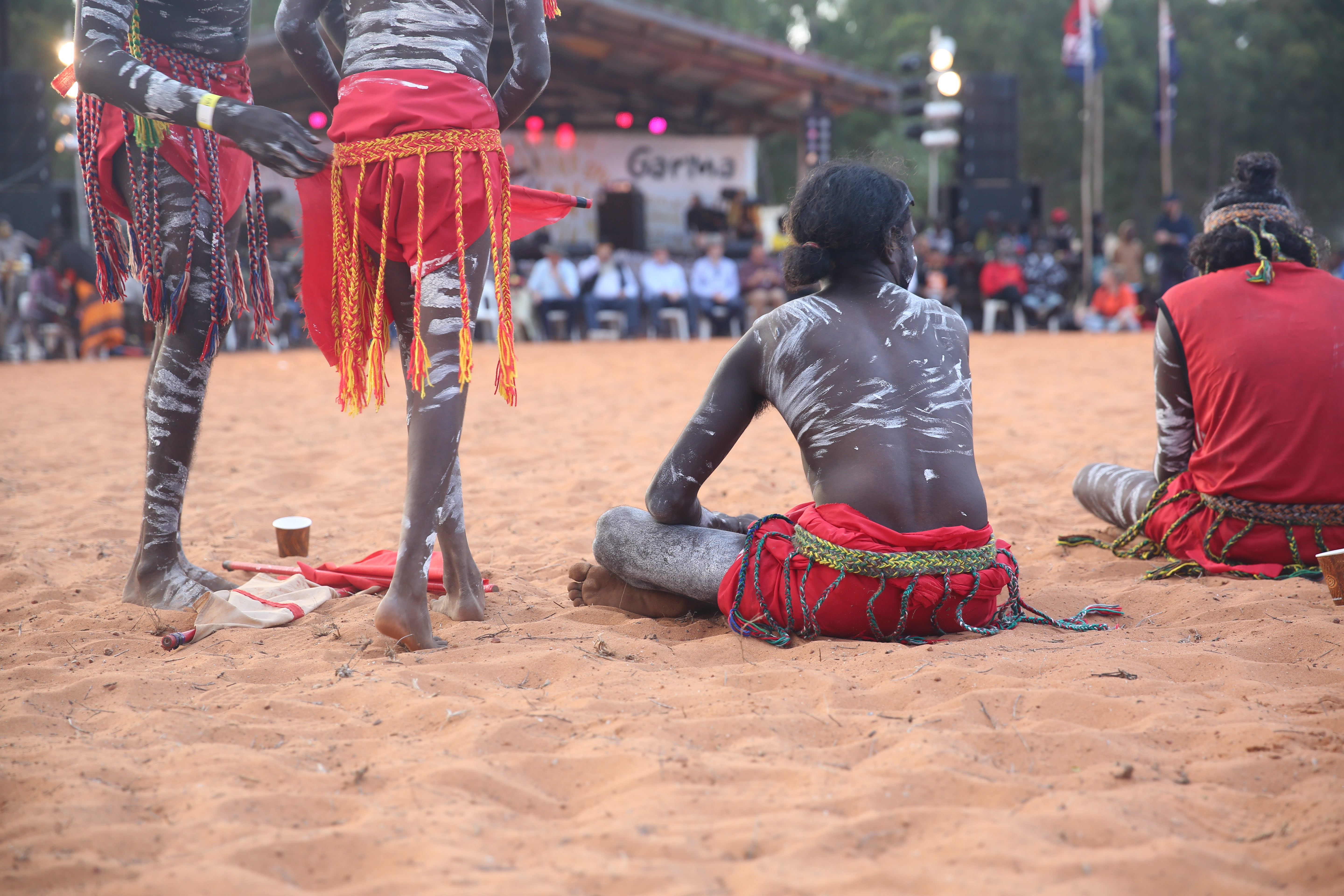
As hosts, the generosity of the Gumatj clan is profound.
When you are welcomed to Gulkula, it is with the gift of place, offered with the sincerity of generations. You are invited, while at Garma, to be a child of Gulkula. And the sacred ceremony grounds are shared with an open heart in the hope that ideas will be shared and everyone will work hard to reach an agreement.
It is not only the Gumatj people who welcome you however; Gulkula welcomes you too.

Politics & Society
The power of Garma
At the time of Garma, the seasonal wind, luŋgurrma, gently blows through the stringybarks across the camp, bringing with it the cool mist over the escarpment. The sky holds stars and constellations — the ancestors — for you to share in through stories of pasts and futures.
The green ants gather on the red earth, the bees collect nectar from the flowering stringybark and the birds offer their greetings at dawn.
This welcome is as important as any other in understanding the conversations held at Garma.
Held over the last weekend in July, this year’s Garma was highly anticipated. After a two-year hiatus due to the pandemic, the return of the Festival offered the opportunity to re-connect with colleagues, friends and community.
With a new federal government and the Prime Minister due to visit the Festival to make an announcement, many felt there was change in the air.
And so there was.
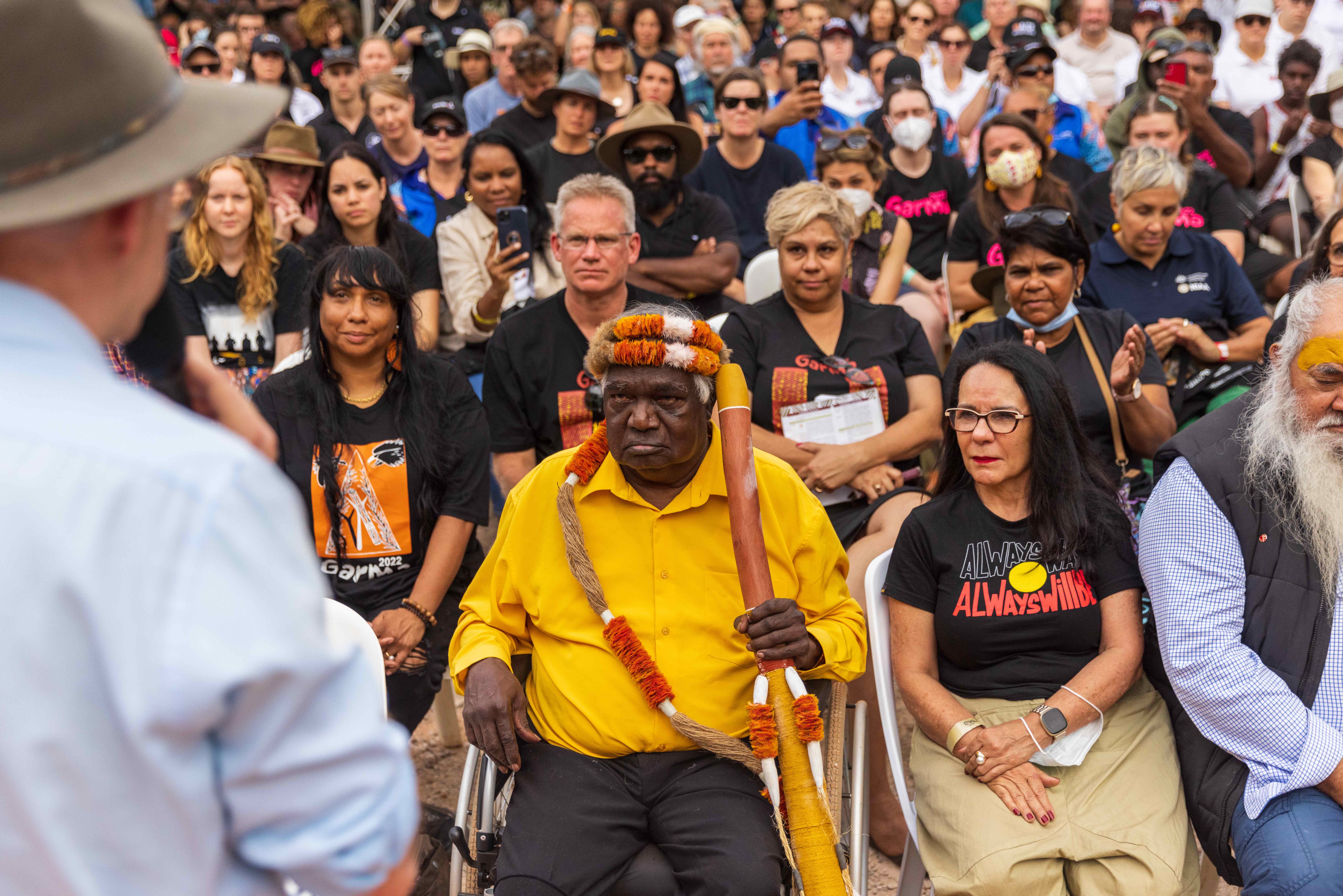
Standing on Gulkula Country, Australia’s 31st Prime Minister, Mr Anthony Albanese, confirmed his government’s commitment to an Indigenous Voice to Parliament. Flanked by a team of Indigenous MPs, Mr Albanese announced his government’s proposed referendum question for the preservation of a Voice in the Australian Constitution.
“We should consider asking our fellow Australians something as simple, but something as clear, as this: ‘Do you support an alteration to the Constitution that establishes an Aboriginal and Torres Strait Islander Voice?’ A straightforward proposition. A simple principle. A question from the heart,” Mr Albanese said.
Fostering an atmosphere only felt on rare occasions throughout Australia’s colonial history, Mr Albanese’s announcements were received with a hope that brought to life the Festival’s theme, nhaŋa ŋathilyurra — look ahead towards the future.

Politics & Society
Going beyond healing to build Indigenous power
The Festival also marked a maturing of the University’s strategic partnership with the area.
Along with the Melbourne and Goulburn Valley regions in Victoria, the Northeast Arnhem Land region is a key partnership focus for the University in its work toward understanding and addressing current Indigenous economic, social and political challenges.
The University’s relationship with the region is enduring, cemented through its partnership with the Yothu Yindi Foundation as its tertiary education partner in 2015.
Building on the deep foundation of relationships and work that has been done over the past two decades, Garma 2022 provided a platform for University staff.
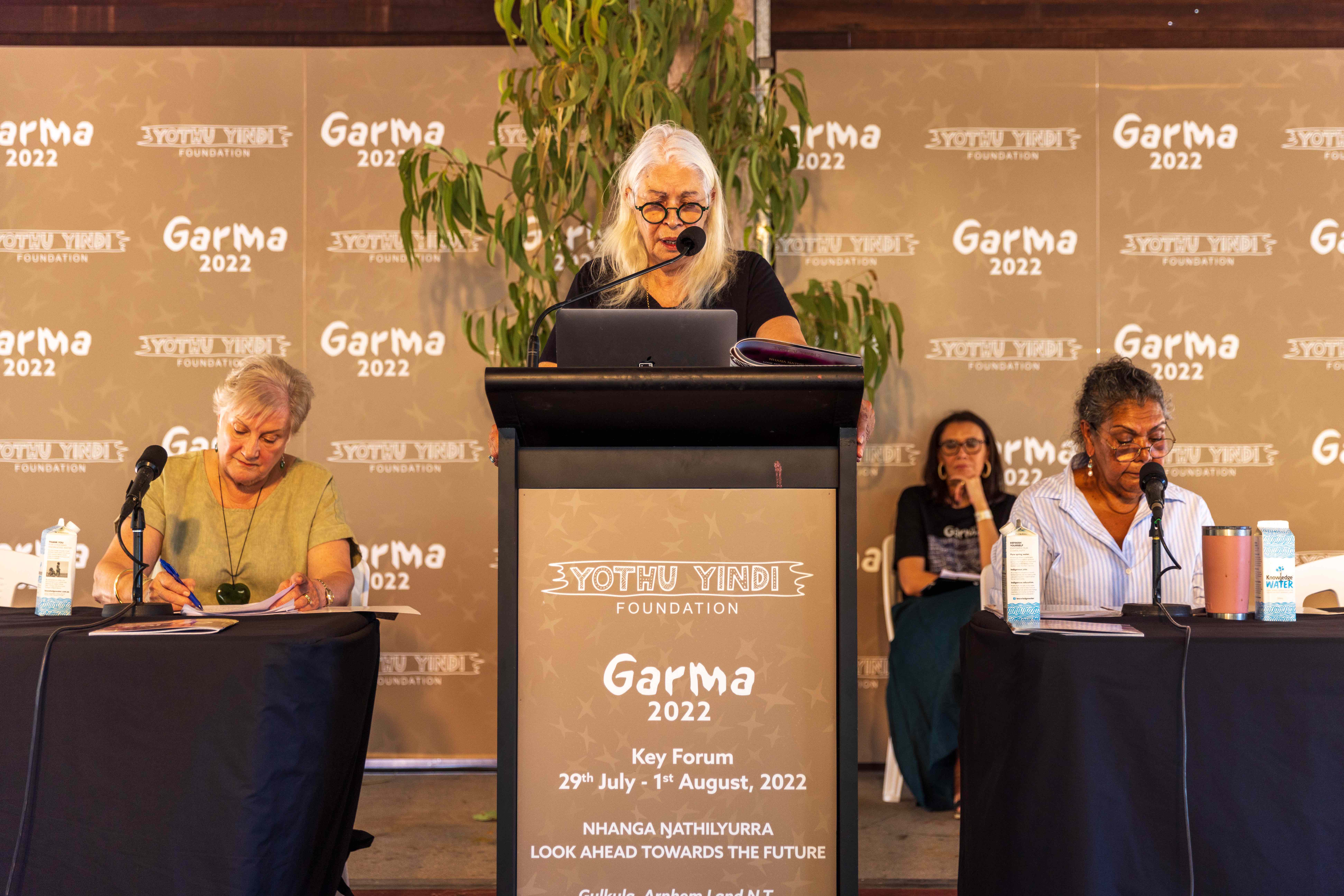
Led by Professor Marcia Langton, a University delegation attended Garma 2022 – which included Vice-Chancellor Professor Duncan Maskell and Provost Professor Nicola Phillips – and provided an opportunity to connect in person once again with Yolŋu leaders at Gulkala.
Being immersed in a Yolŋu world, even if for just a few days, it’s clear that the important things for achieving positive futures in the region are grounded in place and bala ga lili — two-way learning.
The voices of Yolŋu educators, health professionals, law holders and others have consistently and clearly articulated a vision for their futures.

Health & Medicine
Backing the strengths of Aboriginal young people
The long-standing self-determining governance and leadership of the Yolŋu seek to preserve ancient culture and knowledge in a modern world and although the challenges are evident, they are not without solutions.
In the Key Forums of the Garma Festival, these were well demonstrated.
Yirrkala School co-principal, Merrkiyawuy Ganambarr-Stubbs, described the successes of the school in delivering on-country education with reference to life-long learning.
“You’re always learning, you will never stop learning”.
Yalmay Marika-Yunupiŋu, Yirrkala School teacher and linguist, spoke of the bilingual curricula that support both English and Yolŋu-matha at the school.

As qualified teachers, both senior women work hard to foster the next generation of young Yolŋu teachers to continue their work, and in partnership with the University have developed a number of two-way learning opportunities.
Homelands Cultural Advisor Yananymul Munuŋgurr also proudly announced the recognition of the Makarrata program hosted by Garrthalala homeland community as a registered boarding facility. This means Yolŋu students can continue to complete their secondary education on Country rather than having to go away.
Over a decade of work with the Laynhapuy Homelands School and the Yirrkala School has enabled Melbourne School of Graduate Education Master of Teaching students to learn about Yolŋu culture and education by completing the practicum component of their course in these schools.

Education
Learning in the Homelands
Overseen by Bernadette Murphy, this partnership has led to a number of students returning to the Yolŋu schools as qualified teachers.
A number of other important areas of work with Yolŋu leaders to achieve their rightful ambitions were also presented.
Dr Margaret Ayre, Faculty of Veterinary and Agricultural Sciences, has worked with the Dhimurru Aboriginal Corporation for many years advancing the contribution of Yolŋu natural and cultural resource management, including Yolŋu ranger work, to the sustainable management of social-ecological systems.
This work is grounded in Yolŋu culture and self-determination and is recognised as leading work in the Commonwealth government’s State of the Environment report.

Professors Djangirrawuy Gumbula-Garawirrtja and Aaron Corn, Research Fellow and Inaugural Director, respectively, of the University’s Indigenous Knowledge Institute, spoke of the importance of acknowledging and valuing Indigenous bodies of knowledge.
Describing his Yolŋu leadership responsibilities for sharing knowledge and how the University is collaborating to record his work to preserve it for future generations, Professor Gumbula-Garawirrtja showed how his knowledge is carried in the Manikay traditional of Yolŋu ceremonial song.
“It’s not easy being a leader … I had to prove that I am a good person with good judgement and that I will be responsible for the good of community. To earn this responsibility my formal education was through ceremony since I was little, so it’s very important for me to pass on everything that I know.”

Speaking in Yolŋu-matha, Professor Corn thanked all the Yolŋu mentors who guide the University’s collaborations in Northeast Arnhem Land — “Ŋarraka buku-gurrupan marŋgi-gunamirri walalanha”.
Indigenous Law Hub Director and Indigenous Knowledge Institute Theme Leader, Dr Eddie Cubillo, also spoke of the importance of Indigenous knowledge in complex spaces such as health and justice and how these intersections can be supported by work that focuses on Indigenous community priorities.
Melanie Herdman, Chairperson of Miwatj Aboriginal Health Corporation, shared her vision for health in the region, identifying current health priorities and the strategies for achieving these.
Prior to COVID-19 pandemic restrictions, Professor Julie Satur of the Melbourne Dental School had worked with Miwatj and achieved some good outcomes in oral health.
This year’s Garma offered the opportunity to identify further areas of collaboration between the University and Miwatj.
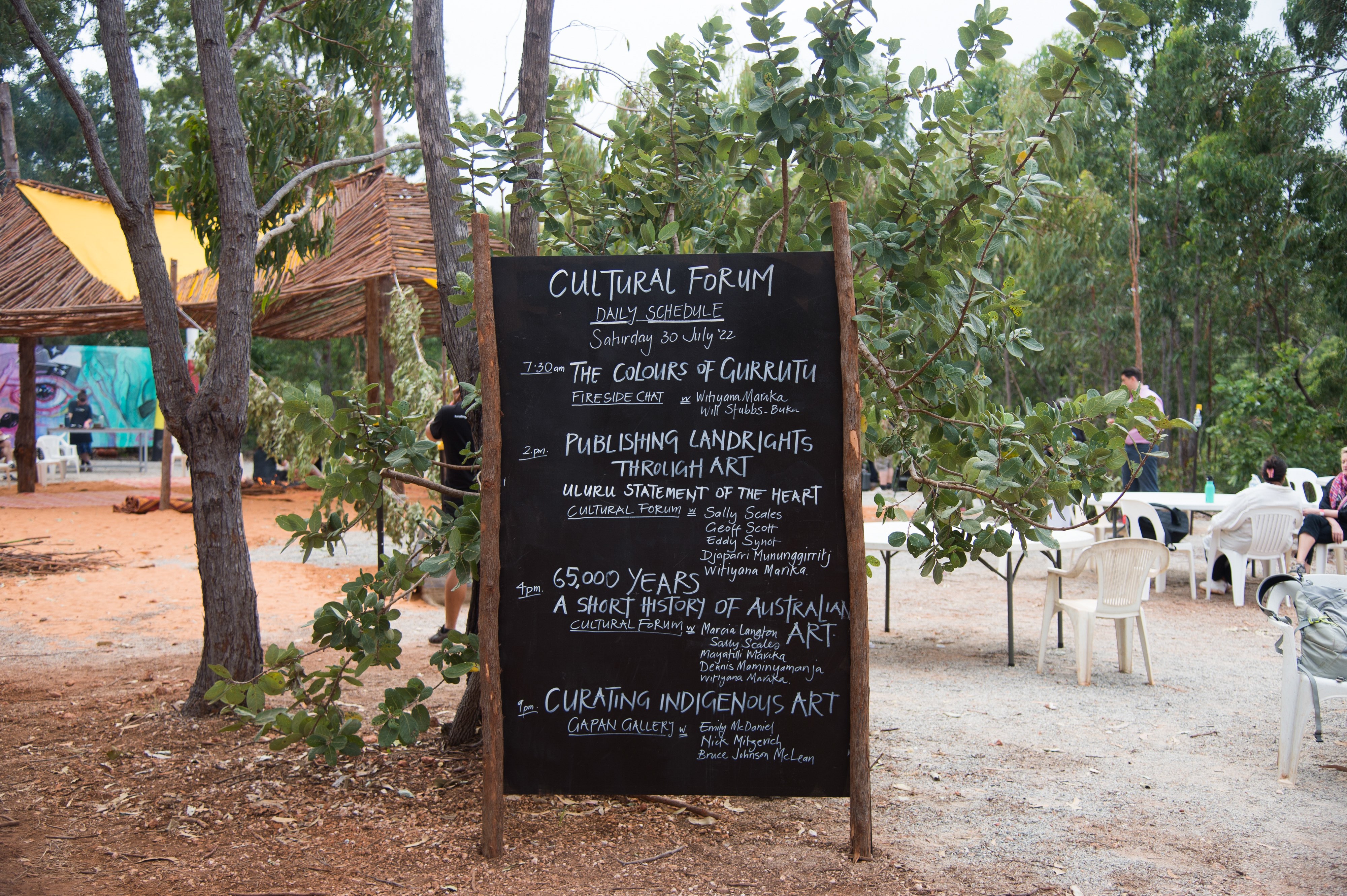
Understanding the University’s role in the Yolŋu vision for their futures requires a willingness to invest in the intellectual capital that Yolŋu people have always fostered in Northeast Arnhem Land.
Djapirri Munuŋgiritj, Yothu Yindi Foundation Board member, articulated what is needed when she spoke of Yolŋu philosophy, knowledge and wisdom coming together through education as a foundation of Yolŋu culture.
Ms Munuŋgiritj issued an invitation to Australia to honour Yolŋu children, as their ancestors did, and “learn from our education … walk with us, embrace us”.
An invitation to walk with the oldest living culture in the world and work together is a privilege.
It asks us to come with purpose, listen deeply and be humble learners; it asks us to reciprocate and communicate with each other, just as the stringybarks do when luŋgurrma moves through their leaves.
Banner: AAP